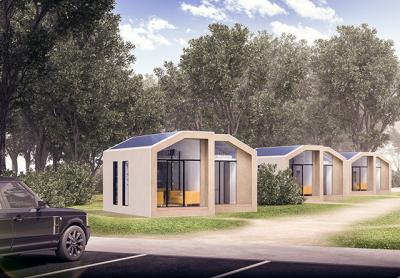Pitch Tiny Houses for Seasonal Workers

The tiny house craze, a proliferation across the country of small dwellings on wheels, similar to recreational vehicles, could be brought to bear on a problem in East Hampton: the lack of affordable housing for seasonal workers.
Ryan Chadwick, a restaurateur and entrepreneur who runs the Grey Lady restaurant in Montauk, is working with other municipalities with seasonal tourism, such as Aspen, Colo., on the installation of mobile modular dwelling units that can be brought in to house workers when needed. A lack of affordable housing in resort towns such as Aspen and East Hampton is a problem both for workers and for business owners who need additional employees during the busy season.
Mr. Chadwick’s company, Kondo, is building a prototype modular small house on wheels, and he has been talking with East Hampton Town Supervisor Larry Cantwell and other officials about a Montauk pilot program.
Housing could be placed on a half-acre piece of town property behind the public comfort station on West Lake Drive in Montauk, according to a discussion of the idea at a town board meeting on Tuesday.
Mr. Chadwick suggests installing six units, providing a total of 30 beds, on the half-acre property to start. However, he said, the site could eventually house 18 of the mobile house units, providing 90 beds for workers.
The units would be temporary and seasonal, and could be removed when not in use. “There is zero impact to the property itself,” said Mr. Chadwick, aside from landscaping that might be installed and the installation of utility lines. As in an R.V., septic waste would be contained and periodically pumped out and removed.
Constructed of building materials made from industrial hemp, a renewable resource, the small dwellings, which Mr. Chadwick described as a “houseboat on wheels,” would be energy efficient and use rain collection, water recycling, and smart technology systems.
Each two-story unit would have a full kitchen with a pull-down dining table, sofas with storage, closets on wheels, and sleeping lofts and bathrooms with full-height showers. The wheels would retract and be hidden when the units are parked. Two modules could be connected to create a larger configuration.
Local businesses would sign up with Kondo to lease a certain number of beds per season. The cost, Mr. Chadwick estimated, would be $150 to $200 per week per bed.
“I think at some point we have to try something like this,” Mr. Cantwell said on Tuesday. “There’s certainly an overwhelming demand for employee housing.”
The use of mobile units was one of several concepts presented to the town board by the town’s community housing opportunity fund and business committees as ways to create more seasonal work-force housing. In a recent memo, the committees also recommended that the board consider allowing businesses to rent or buy houses that are in commercial districts and use them to house up to eight workers, or a maximum of two per bedroom. The town code at present prohibits more than five unrelated people from living in one house. There are 96 houses in the town located in nonresidential districts.
Having businesses house employees on their own properties is another idea.
The committees suggested allowing any business, regardless of the constraints of its zoning district, to voluntarily construct on-site employee housing, as long as it conforms to other zoning and setback regulations and receives site-plan approval. The housing would not be considered an additional use of the property or an expansion of a business.
The board could also require motels, hotels, and other large businesses to add affordable seasonal employee housing when undertaking new construction or a major renovation, the committees suggested.
“Of all the options we discussed,” said Councilman Peter Van Scoyoc, the tiny house model “is the most readily achievable.” And, he said, it would likely meet the least resistance from members of the community. Boat storage areas at marinas, which are emptied in summer of the vessels kept there through the winter, could also become locations for mobile modular houses, he suggested.
“Absolutely we have to do something of this nature,” said Bill Akin, a member of the Montauk Citizens Advisory Committee who heads the group’s subcommittee on seasonal housing. With the Montauk Chamber of Commerce, his group did a survey and found that local businesses were housing approximately 3,000 seasonal workers. That number does not account for employees who rent rooms from residents, commute from elsewhere, or are housed in “subpar conditions,” Mr. Akin said.
At the board’s request, town attorneys will look into the legalities of initiating a pilot program setting up seasonal mobile dwellings. “And,” said Mr. Cantwell, “we’ll go from there.”
